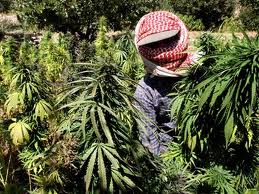
Charles Siragusa, an agent of the Federal Bureau of Narcotics in the US, visited Lebanon on Sept. 7, 1950 in order to instigate the illicit drug trade. He was utterly surprised by how easy it was to establish connections and learn about the drug trade in Lebanon.
Art Guedikian, the owner of the Victory Bar in Beirut proved to be full of information about the source of Hashish, where it is processed and who is in control of the trade. Mr. Guedikian takes Charles on a trip to the Bekaa where he learned that Sabri Hamade was the most influential marijuana farmer in Lebanon. Mr. Hamade was the Speaker of the Lebanese parliament, a feudal landlord and the unquestioned leader of the eight parliamentarians in the district of Hirmel. It became very clear also, that Ahmad Al Asad , the largest landlord in southern Lebanon was Mr. Hamades’ partner. Sabri Hamadeh arranges for Hashish to be produced in the Hirmel and Mr. Asad provides the sea outlets for their final journey to Egypt and then the United States. The most interesting about this relationship was the fact that both had the support of the president Beshara Khoury; whose son Khalil was implicated by the Egyptian police of trafficking in opium; and the Prime Minister Riad Solh in addition to Abdallah Yafi, another PM. I ronically Mr. Hamade sat on a parliamentary committee to eradicate hashish.
Hashish, the petroleum of Lebanon, was introduced as a crop in 1920 as a replacement for natural silk which could no longer compete with Japanese artificial silk and rayon. It is estimated that every 4000 square meters produces about a ton of Cannabis or 18-25 Kilograms of Hasheesh.The total yield of the Bekaa valley was estimated to be about 60 tons per annum as far back as 1928Some suggest that Mr. Ibrahim Haidar, the Agriculture Minister also played a major role in facilitating the drug trade.
Independence proved to be an opportunity to increase the production of hemp as a report to the US Secretary of State in 1948 makes clear:”Since the withdrawal of Allied troops in December of 1946, the cultivation of Indian hemp…has increased in alarming proportions”.
The various drug eradication campaigns can best be described as a farce. Farid Chehab, in charge of the narcotics enforcement, called the effort not well intentioned and was intended to be a hollow show. He went on to implicate both Camille Chamoun, the president of the republic and Sami Solh, the PM.
Yet in spite of all of this the administration of President Charles Helou had some limited success in encouraging about a 1000 farmers to switch from Cannabis to sun flower. Ultimately though, the program failed to take hold since the yield from sunflower was less than that from Hashish and at a greater cost.
As the use of drugs gained wider use all over the world the value of Lebanese hashish increased substantially if for nothing else but the new global markets. The Bekaa valley became increasingly a drug user’s destination since a kilogram of hashish sold in Lebanon for only 1% of its street value in the US. The reputation of Lebanese “red” and Gold had spread all over the world, from Europe to the US and Australia.
The next President, Suleiman Frangieh, continued the Sun flower seed substitution program but with very limited success at best. Unfortunately Mr. Frangieh does not seem to fare much better than other presidents. In a US Senate testimony it was alleged by a witness that “private armies under the control of the pro-Syrian Frangieh family in the Bekaa Valley…rely on narcotics for as much as half of their treasury”. But it is also worth mentioning that the humiliating search for drugs that the whole entourage of President Frangieh was subjected to at JFK in 1974 did not result from either DEA or CIA operatives. It is suspected that Israeli intelligence was behind that affair.




2 comments:
I hope that Suleiman Frangieh will be confronted with that quote about his clan and drugs. He plans to run for presidency next year.
Do you think that it will make any difference?:-) I sure hope that it would but I am afraid that (1) No one will dare confront him and (2) even if he is confronted that it will be dismissed.
Post a Comment